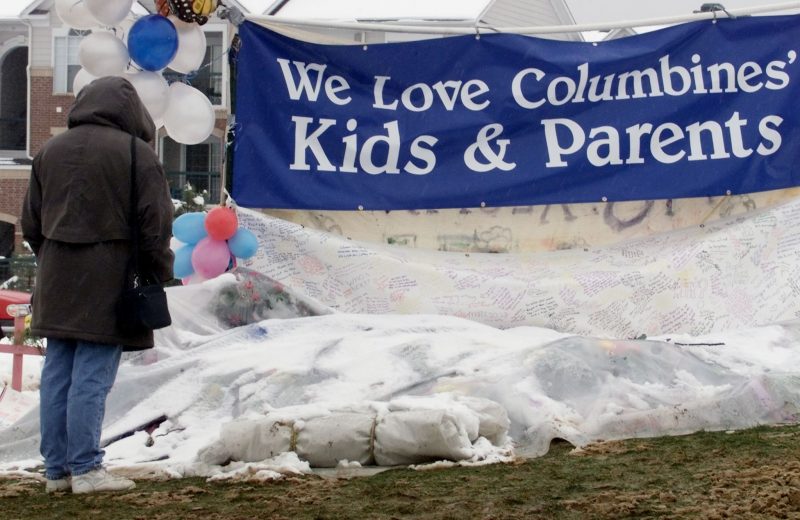Remembering the horror of the Columbine shooting 20 years on
A makeshift altar in memory of the victims of the shooting at Columbine High School in 1999 (JEFF HAYNES)
Littleton (United States) (AFP) – One of them saw the killers, while the other just heard the gun shots, one after another, that killed 13 people at Columbine High School and wounded more than 20 others.
Twenty years after that massacre of 12 students and one teacher in Colorado, two survivor have yet to heal their wounds, and these gashes rip open again every time there is another mass shooting in America.
Amanda Duran, who was 15 at the time, told AFP that subsequent mass killings, like the one in Las Vegas in 2017 at a country music festival and the school shooting in Parkland, Florida last year, “really get me freaked out.”
“I spent 19 years before that just being sad and broken-hearted, but now it has just turned to angry,” said Duran. “I started to get angry because it’s like nothing has changed at all.”
Duran recalls that nightmarish day of April 20, 1999 vividly. She had an appointment with a school counselor because she was having personal problems at school.
She was in the library, waiting for her meeting, when she started hearing “popping noises.”
Then two heavily armed students burst into the library. They were Eric Harris and Dylan Klebold, whom she did not know.
She scrambled under a table to seek shelter.
“I hear this ‘boom’ right next to me, when they’d shot the girl next to me,” she remembers.
“I went deaf at that point and I thought for sure that I was going to be next.”
“So I curled up really, really tight, put my arms above me like this and just kinda held my breath, braced myself to get shot in the ribs. Just waited, waited.”
At about the same time, Alisha Basore, 17, was walking to her art class. The blasts from the guns sent students scrambling. Coincidentally, Basore had suffered a gunshot wound in an accident four months earlier, so she had trouble running but managed to get away.
“I don’t have any bullets whizzing past my face or somebody holding a gun to my face, nothing like that,” Basore recalled.
“But, unfortunately for me, that doesn’t stop the trauma or what was to come over the next few weeks, years, the funerals, the finding out your friends were killed, finding out somebody you just spoke to yesterday was one of the victims, you know.”
– Toll on survivors –
At the time, Columbine was the deadliest school shooting in United States history. It shocked the nation to its core.
In the years that followed, the survivors battled all kinds of emotional problems, such as severe anxiety attacks and insomnia.
Basore, who went on to become a hairdresser, developed the eating disorder bulimia and still suffers from it.
“That is a vicious beast that won’t go away. But overall, I have definitely learned to just kind of deal, I guess,” said Basore.
Duran, who works in a Walmart store, relaxes by watching cat videos on the internet. She says he husband pokes fun at her, but it calms her down.
But tragedy struck again in 2007, when Duran’s brother Joe — who had been through a divorce and had been depressed for years — committed suicide.
At Columbine, he had been part of a loose group of marginalized kids who called themselves the “trench coat mafia” because of their garb.
Although the shooters were not part of the group, Joe Duran was suspected of being linked to them and received death threats after the mass shooting, his sister said.
After her brother killed himself, people on the internet said they were glad. Amanda Duran felt the need to speak out in his defense, publishing a series of videos on YouTube, which she said was cathartic.
– Anger over inaction –
But subsequent shootings sent her back into deep sadness. She said it was appalling that politicians did nothing to tighten America’s gun laws.
After the shooting at Sandy Hook elementary school in Connecticut that killed 26 people in 2012, “you would have thought someone would have come with more gun laws or require (a) mental health workout before you are allowed to buy a gun,” she said.
“But nothing of that sort happened. So I have just been angry and pissed off.”
For Basore, “mental health is in my opinion… a far bigger fight and a far bigger question and a far bigger interest, because no gun ever jumped off of the ground and shot someone. It’s who is holding that weapon.”
Duran said she “admires the Parkland kids for standing up, working to change gun laws,” referring to survivors of a school shooting that killed 17 people, who have spent the last year advocating for tighter gun regulations.
“We just wanted to go back to normal,” said Duran.
But that has not yet happened.
Disclaimer: Validity of the above story is for 7 Days from original date of publishing. Source: AFP.


